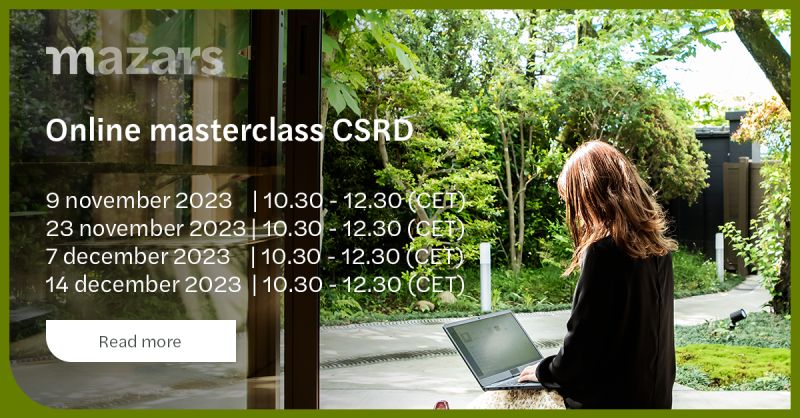
Have you already started preparing for the upcoming Corporate Sustainability Reporting Directive (CSRD) legislation? Are there challenges you want guidance on? Or would you like to get started, but don’t know how? The Sustainability team would like to invite you to an online masterclass on the CSRD.
In addition to the masterclass on location, we organise an online, shortened version on CSRD. In a series of four sessions of two hours, we will take you through the background of CSRD, the importance of a thorough materiality analysis, calculating environmental impact and calculating social impact. The sessions will be informative with room for interaction.
Part 1 | Introduction to sustainability and the CSRD
Thursday 9 November 2023 | 10.30 – 12.30 (CET)
Listed organisations and large companies will have to start reporting on their environmental, social and business conduct (Environment, Social, and Governance – ESG) impact in the coming years. These large organisations must also report on their impact on the value chain, including, for example, suppliers. Many SMEs supply large organisations. Thus, this reporting obligation might also indirectly affect SMEs.
These new reporting requirements will have a major impact on companies, but also on their service providers such as their auditors. This introductory training will enable you to start working on these issues within your company. Only with a good basic understanding of the developments will we all be able to further start the movement towards a sustainable economy.
Part 2 | Getting started with double materiality (ESRS 1 & ESRS 2)
Thursday 23 November 2023 | 10.30 -12.30 (CET)
Double materiality analysis is the starting point for sustainability reporting. Double materiality works both ways. On the one hand, it deals with the significant sustainability-related risks and opportunities for the organisation, such as water and drought damage, reputational risks or carbon taxes. This is often referred to as ‘outside-in’: the (financially) material impact on the organisation. On the other hand, it is about the (potential) impact, positive or negative, that the organisation has on people and the environment. Think of damage to biodiversity, human rights violations or a positive contribution to solving the world food problem. This perspective is called ‘inside-out’.
In this part of the masterclass, we will walk you through the process of double materiality and give you tools to get started yourself in concrete terms.
Part 3 | Calculating environmental impact (E1 to E5)
Thursday 7 December 2023 | 10.30 -12.30 (CET)
Organisations have an impact on the environment and must also respond to the opportunities and risks presented by environmental themes. The ESRS’ Environmental standards describe how companies should report on topics such as greenhouse gas emissions, pollution, water, biodiversity and circularity.
In this part of the masterclass, we will take you through the different standards. We will provide practical guidance on how to map your environmental impact and offer examples of how to respond to the opportunities and risks presented by climate change. We will also go through the basic principles for calculating your organisation’s CO2 impact so that you can start working on this in concrete terms.
Part 4 | Calculating social impact (S1 to S4 & G1)
Thursday 14 December 2023 | 10.30 -12.30 (CET)
In this final part of the masterclass, we will give you an insight into what you are required to report on the social and governance components of CSRD. The social standards cover your own employees, employees in the value chain, local communities and the impact of products on the end user whereas the governance standard details how an organisation should report on its business conduct through topics such as corruption, whistleblower procedures, payment practices but also animal welfare.
We will take you through the different standards and provide you with practical tools and examples to map your impact on these topics. We will also take you through the risks and opportunities presented by social and governance issues.
Who is the CSRD masterclass suitable for?
This masterclass is suitable for companies that are required to comply with CSRD. These are organisations that meet at least two of the following three requirements:
- 40 million in annual turnover
- 20 million in balance sheet total
- 250 or more employees
In addition, companies are also welcome if they wish to voluntarily comply with the CSRD.
Costs
The cost for participating in the entire online masterclass is € 300 excluding VAT.



